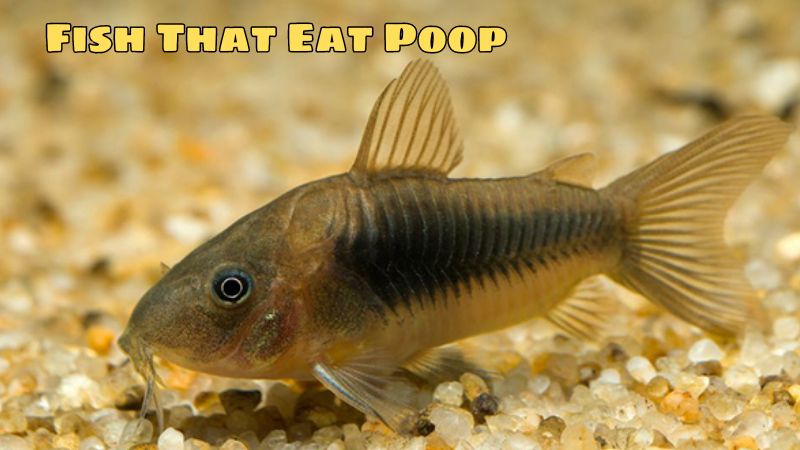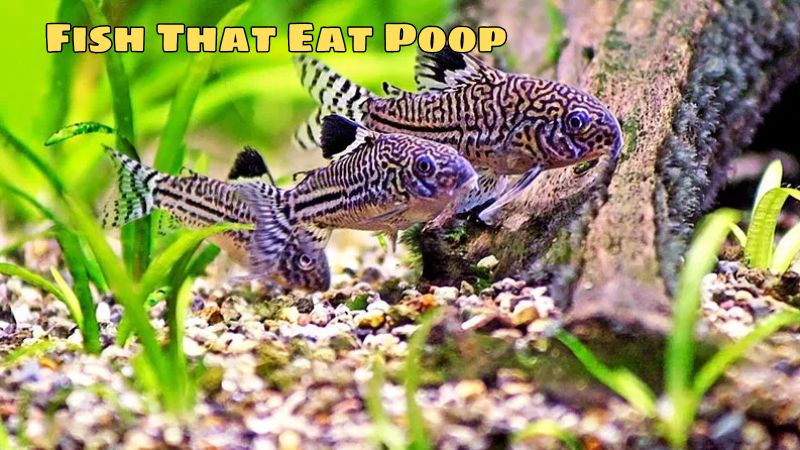Fish Species
Fish That Eat Poop: Role In Aquatic Ecosystems
Dung eating fish are a group of fish species that play a special role in water ecosystems, from ponds to aquariums. They not only help clean the aquatic environment by consuming manure and organic debris, but also contribute to maintaining ecological balance.
Join Fishtankfables to learn about fish that eat poop and how their applications can help improve water quality and the development of aquaculture ecosystems.
Types of Fish That Eat Poop
1. Fish clean the tank
Fish fish (Otocinclus spp.): Fish fish are one of the most popular tank-cleaning fish in freshwater aquariums. They are small in size and live in groups, helping to effectively clean algae and debris in the tank.
Siamese algae eater – Crossocheilus siamensis: Pied fish are famous for their ability to kill algae and clean fish tanks. They often eat green algae and can help keep tank water clean.
Snails (Neritina spp., Apple snail): Although not fish, snails are also very useful in cleaning fish tanks. They eat algae, moss and other debris, helping to keep the aquarium clean.
Tank cleaner fish play an important role in maintaining the ecological balance of the aquarium. They help control algae growth, minimize odors and clean up food debris or fish feces, contributing to a healthy habitat for other fish.
2. Fish in the wild
Catfish: Catfish, especially species such as black catfish or African catfish, often live in muddy waters and feed on foods from the bottom, including animal feces and carcasses. plants and other debris.
Tilapia: Tilapia is a popular fish in ponds and lakes and is known for its ability to eat foods from the bottom, including feces and animal carcasses. They contribute to cleaning the water environment and maintaining underwater ecosystems.

Benefits and Harms of Fish Eating Dung
1. Benefits
Helps clean the water environment
Feces-eating fish, especially cleaner fish in aquariums, help maintain a clean and healthy water environment. They consume fecal debris and uneaten food, reducing the amount of waste and algae in the water. This helps prevent excessive algae growth and maintains water quality, creating favorable conditions for the growth of other fish and plants.
Provides nutrition for fish
Some fecal-eating fish can provide additional nutrients for other fish in the ecosystem. Manure and fecal debris contain useful nutrients such as protein and minerals, providing the fish that consume them with a rich source of nutrition, supporting their growth and health.
Maintain ecological balance
Dung-eating fish play an important role in maintaining the ecological balance of the water ecosystem. By consuming feces and detritus, they help control the growth of unwanted organisms, maintain a balance between species, and keep water ecosystems functioning properly.
2. Harmful effects
Can transmit disease to fish
Fish feces and debris can contain disease-causing bacteria, parasites or viruses. If fish eat infected feces, there is a risk of spreading these pathogens to other fish in the same ecosystem, leading to outbreaks of diseases in the aquarium or aquatic environment.
Causes water pollution
Although fish eating feces helps clean the environment, if not controlled properly, large amounts of feces can lead to water pollution. Sewage that is not properly treated can cause an increase in the concentration of organic matter and toxic substances, reduce water quality and harm other organisms.
Affects food quality (if eaten)
If fish consume feces from sources that are unclean or contain toxic substances, the quality of the food they produce may be affected. Toxic substances in feces can accumulate in the fish’s body, leading to the fish becoming unsafe for consumption, affecting human health if the fish is used as food.
Application in Aquaculture
1. Commercial Fish Farming
Use feces-eating fish to clean ponds
In commercial aquaculture, maintaining a clean and healthy water environment is very important. Fecal-eating fish, such as the fish fish or pipa fish, are used to clean ponds by consuming feces and excess debris from other fish species. They help reduce waste and prevent the accumulation of debris, thereby minimizing the risk of contamination and maintaining healthy growth of commercial fish.
Improve water quality
Fish eating feces not only helps clean the environment but also contributes to improving water quality in ponds. By consuming feces and waste, these fish help reduce ammonia and nitrate levels, which can pollute and damage the health of farmed fish. This helps maintain the chemical balance of the water and creates favorable conditions for the growth of commercial fish.
2. Raising Ornamental Fish
Choose the right type of fish that eats feces to clean the aquarium
In aquarium fish farming, choosing the right type of fish that eats feces is very important to keep the aquarium clean. Tank cleaner fish such as lampreys or tank cleaner fish can help remove debris and waste from other fish in the tank. This helps minimize algae growth and maintain a clean water environment, creating favorable conditions for the health of aquarium fish.
Balance the ecosystem in the tank
Dung-eating fish play an important role in maintaining ecological balance in the aquarium. They help control the accumulation of feces and other waste, thereby maintaining stable water quality. The presence of these fish not only helps keep the aquarium clean but also supports the growth of aquatic plants, creating a healthy and balanced aquarium ecosystem.
Factors Influencing Fish Eating Feces
1. Fish Species
Biological characteristics of each species
Each fish species has different biological characteristics, which directly affect their eating habits. Fish species that specialize in eating feces such as fish fish, pipa fish, or tank cleaning fish have the body structure and digestive system suitable to consume and digest feces and debris in the aquatic environment.
Meanwhile, other fish species may not be able or interested in eating feces, but may instead consume other food sources. Therefore, choosing the right fish species based on their biological characteristics is very important to achieve optimal effectiveness in cleaning the water environment.
2. Living Environment
Water quality
The water quality in a pond or fish tank affects the ability and efficiency of fish to eat feces. If the water is too dirty or has too much waste, it can reduce the health of the fish and their digestive ability. In addition, oxygen concentration, pH, and other chemical factors also affect the activity of fecal-eating fish. Ensuring a clean and well-controlled water environment is essential for fecal-eating fish to function effectively.
Available food sources
The availability of food sources other than feces also affects the eating habits of fish. If there are many other food sources, fish may choose these foods instead of eating feces. On the contrary, if the main food source is feces, fish will have an easier time consuming and digesting feces.
3. Size and Age of Fish
Juvenile fish often eat more than adult fish
The size and age of fish affect their ability to eat poop. Juvenile fish often need to eat more and may consume more feces than adult fish to support development and growth. Meanwhile, adult fish may eat less feces because they may have a steady diet and are less dependent on feces as a primary food source.
Variation in the dietary habits and digestive abilities of fish with age and size should also be considered when planning for the use of fecal-eating fish in aquaculture environments.
Epilogue
Fish that eat poop play an important role in maintaining the balance and cleanliness of aquatic ecosystems, from ponds to aquariums. They help clean aquatic environments and support ecosystems by consuming manure and other organic debris.
However, appropriate management and selection of fish species, as well as ensuring water quality, are necessary to optimize their benefits and minimize their harmful effects.

